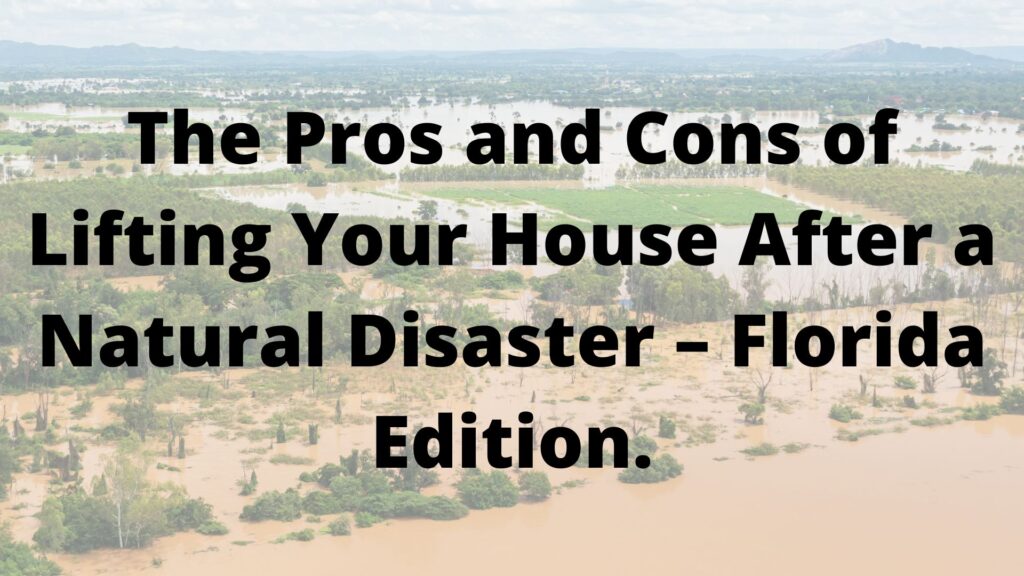
Natural disasters can wreak havoc on homes, leaving homeowners with tough decisions about how to rebuild and protect their properties. One option that has gained popularity is house lifting, which involves raising a house above its original foundation. This method can offer several benefits, but it also comes with its own set of challenges. In this article, we’ll explore the pros and cons of lifting your house after a natural disaster, with a focus on the rules and regulations in Florida.
Pros of Lifting Your House
- Flood Protection: One of the primary reason’s homeowners choose to lift their houses is to protect against future flooding. By raising the house above the flood level, you can significantly reduce the risk of water damage during heavy rains or hurricanes.
- Increased Property Value: Elevated homes are often seen as more desirable, especially in flood-prone areas. This can lead to an increase in property value and make the house more attractive to potential buyers.
- Lower Insurance Premiums: Insurance companies may offer lower premiums for homes that have been lifted, as they are considered less risky. This can result in long-term savings on your homeowner’s insurance.
- Improved Structural Integrity: Lifting a house provides an opportunity to reinforce the foundation and address any existing structural issues. This can make the house more resilient to future natural disasters.
- Additional Living Space: The space created beneath the lifted house can be used for storage, parking, or even additional living areas, depending on local zoning regulations.
Cons of Lifting Your House
- High Costs: House lifting is a complex and expensive process. The costs can vary widely depending on the size of the house, the condition of the foundation, and the local labor rates.
- Disruption and Inconvenience: The process of lifting a house can be disruptive to your daily life. It often requires you to vacate the property for an extended period, and there may be noise and construction debris to deal with.
- Regulatory Hurdles: Navigating the permitting process and complying with local building codes can be challenging. Each municipality may have different requirements, adding to the complexity of the project.
- Potential for Damage: There is always a risk of damage to the house during the lifting process. This can include cracks in the walls, damage to plumbing and electrical systems, and other structural issues.
- Limited Applicability: Not all houses are suitable for lifting. Factors such as the type of foundation, the condition of the house, and the surrounding terrain can all impact whether lifting is a viable option.
Rules and Regulations in Florida
In Florida, house lifting is subject to strict regulations to ensure safety and compliance with building codes. Here are some key points to consider:
- Permits: Homeowners must obtain the necessary permits from their local building department before starting any house lifting project. This typically involves submitting detailed plans and undergoing inspections.
- Elevation Requirements: Florida has specific elevation requirements for homes in flood-prone areas. These requirements are designed to minimize the risk of flood damage and are based on the Base Flood Elevation (BFE) determined by FEMA.
- Licensed Contractors: The state requires that house lifting be performed by licensed contractors who are experienced in this type of work. This helps ensure that the project is completed safely and to code.
- Building Codes: The Florida Building Code outlines the standards for house lifting, including structural requirements, materials, and methods. Compliance with these codes is mandatory.
- Environmental Considerations: In some cases, environmental regulations may also apply, particularly if the house is located near wetlands or other protected areas. Homeowners may need to obtain additional permits or conduct environmental impact assessments.
Conclusion
Lifting your house after a natural disaster can offer significant benefits, including flood protection, increased property value, and lower insurance premiums. However, it also comes with challenges such as high costs, regulatory hurdles, and potential for damage. In Florida, homeowners must navigate a complex web of permits, building codes, and environmental regulations to ensure their project is successful. By carefully weighing the pros and cons and working with experienced professionals, you can make an informed decision about whether house lifting is the right choice for you.
[1]: Ablison [2]: CORT [3]: AspiringYouths [4]: Florida Senate [5]: Florida Building Code
References
[1] 50 Pros and Cons of Rebuilding after a Natural Disaster
[2] Reclaiming Home After a Natural Disaster | CORT
[3] Advantages and Disadvantages of House Lifting – AspiringYouths
[4] Chapter 399 – 2018 Florida Statutes – The Florida Senate
[5] Chapter 399 – 2019 Florida Statutes – The Florida Senate
 The author, John Caravella Esq., is a construction attorney and formerly practicing project architect at The Law Office of John Caravella, P.C., representing architects, engineers, contractors, subcontractors, and owners in all phases of contract preparation, litigation, and arbitration across New York and Florida. He also serves as an arbitrator to the American Arbitration Association Construction Industry Panel. Mr. Caravella can be reached by email: [email protected] or (516) 462-7051.
The author, John Caravella Esq., is a construction attorney and formerly practicing project architect at The Law Office of John Caravella, P.C., representing architects, engineers, contractors, subcontractors, and owners in all phases of contract preparation, litigation, and arbitration across New York and Florida. He also serves as an arbitrator to the American Arbitration Association Construction Industry Panel. Mr. Caravella can be reached by email: [email protected] or (516) 462-7051.
The information provided on this website does not, and is not intended to, constitute legal advice; instead, all information, content, and materials available on this site are for general informational purposes only. Readers of this website should contact their attorney to obtain advice with respect to any particular legal matter. No reader, user, or browser of this site should act or refrain from acting on the basis of information on this site without first seeking legal advice from counsel in the relevant jurisdiction. Only your individual attorney can provide assurances that the information contained herein – and your interpretation of it – is applicable or appropriate to your particular situation. Use of, and access to, this website or any of the links or resources contained within the site do not create an attorney-client relationship between the reader, user, or browser and website authors, contributors, contributing law firms, or committee members and their respective employers.
